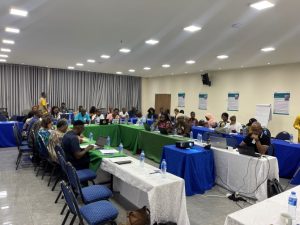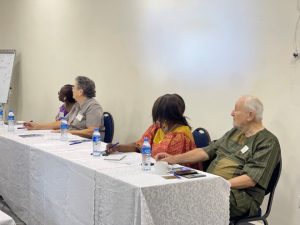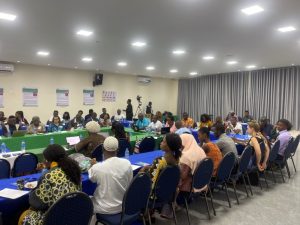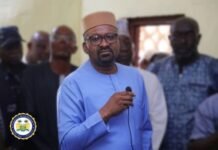By Foday Moriba Conteh
During a well-attended ceremony held on Friday 20th December 2024, the THRIVE Early Childhood Development (ECD), in partnership with Oxford Policy Management (OPN), has concluded a one-day meeting on dissemination of findings from a study on child care and informal early learning in hard-to-reach communities in Sierra Leone. The event which was held at New Brookfields Hotel in Freetown aimed to serve as an opportunity where researchers shared their evidence-based insights, highlight challenges and foster collaboration to improve early learning in underserved areas.
In her address, Professor Mary Hodges, Principal Investigator said the study, conducted to evaluate public perceptions and access to early childhood education (ECE), underscores a significant demand for early education services across the country, even in the most remote areas.
Prof. Mary Hodges emphasized the public’s readiness for ECE, stating, “There is a resounding demand for early child education nationwide. Even in hard-to-reach villages, parents are eager to enroll their children as young as three years old in school. However, accessibility remains a key barrier, particularly in remote communities where the journey to the nearest school is a significant challenge.”
She added that public opinion on the importance of early childhood education has undergone a dramatic shift over the past two decades. Parents now recognize its role in preparing children for primary school and improving their academic performance.
While commending the Government’s progress in implementing Early Childhood Development (ECD) programs, Prof. Mary Hodges noted that gaps remain in reaching remote communities. “There are many more villages than schools and distance continues to be a barrier. Building schools where population density supports them is a step forward, but for younger children, the distance is often too great,” she said.
Prof. Mary Hodges called for greater inclusivity in ECD initiatives, particularly by collaborating with Sierra Leone’s Islamic education network. “The Islamic community has a widespread network of madrasas and kharanthas, with Imams teaching at the village level. Integrating these educators into Government programs could significantly expand access to early child education,” she recommended.
The findings of the study offer critical insights to guide policymakers, educators and development partners in addressing barriers to early childhood education. Prof. Mary Hodges praised the Ministry of Basic and Senior Secondary Education for its commitment to improving ECD services and urged continued collaboration and innovation to meet the growing demand.
Abu Bakarr Kuyateh, Director of Programs and Services at the Ministry of Basic and Senior Secondary Education (MBSSE), outlined the Government’s commitment to improving early childhood development (ECD) through policies, infrastructure and teacher support. “Three years ago, the Government mandated that every primary school must include an ECD center, commonly referred to as a nursery school. This policy has been the foundation of our efforts to ensure access to quality early education,” he explained.
He highlighted several achievements under the ECD initiative, including the construction of 59 state-of-the-art ECD centers across the country, provision of teacher training, learning materials and Government-paid salaries for ECD educators, recruitment of over 1,000 ECD teachers to strengthen early learning programs and expansion of classroom facilities in primary schools to accommodate ECD centers.
“These efforts reflect our determination to address challenges and ensure that every child has a strong foundation for future academic success,” Abu Bakarr Kuyateh added.
The study, conducted by Thrive Early Childhood Development (ECD) in collaboration with partners, revealed key insights into the challenges and opportunities in ECD programs. It emphasized the importance of early morning feeding programs for children in underserved communities, noting the link between nutrition and learning outcomes.
Abu Bakarr Kuyateh assured that the Government is already expanding its school feeding program to include ECD centers, ensuring children receive nutritious meals to support their learning. “We have started providing school feeding and fee subsidies for some ECD centers, recognizing their critical role in childhood development,” he said.
He acknowledged concerns about the implementation of recommendations from studies like this one, assuring stakeholders that the Ministry is committed to acting on the findings. “We have already begun implementing several recommendations, such as constructing ECD facilities and training educators. While challenges remain, we are steadfast in our efforts to improve early childhood education,” he stated.
Regina Yillah, Country Manager for Thrive and Founder & CEO of the Institute for Development (IFD) Sierra Leone, highlighted the need to leverage existing community resources to address gaps in Early Childhood Education (ECE). “We’ve seen so many entry points, including Islamic platforms such as madrasas, which can be harnessed in the short term while we work towards formalizing child care and education systems,” she said.
The study examined the realities of informal early childhood development in Sierra Leone, where only 20% of children currently have access to formal education. Despite these challenges, the research uncovered positive practices within communities, such as creative play and parental engagement.
Regina Yillah underscored the broader concept of early childhood development, emphasizing that it encompasses more than just academic skills. “ECD is not just about learning your ABCs; it’s about being healthy, learning hygiene practices like hand washing and accessing nutritious food,” she explained.
She pointed out that parents often lack knowledge about nutritious food options available locally and stressed the importance of equipping communities with tools to prepare children for school readiness.
The Country Manager for Thrive and Founder & CEO of the Institute for Development (IFD) expressed pride in IFD’s efforts to enhance local research capacity, which she described as “mind-blowing.” “We’ve trained young researchers who are now providing high-quality evidence to inform Government and development partner programs,” she said.
She praised the observational approach of the study, noting, “This is the first anthropological study I’ve seen where researchers carefully observed communities without rushing to conclusions. The insights are powerful.”
Regina Yillah assured attendees that collaboration with the Ministry of Basic and Senior Secondary Education (MBSSE) and the Ministry of Health has been integral to the research process. “This research isn’t just a report to sit on a shelf. We’ve been engaging the ECD unit and other stakeholders from the start, ensuring that findings are already in their decision-making processes,” she said.
As the study’s findings were shared, Regina Yillah reiterated the long-term commitment of IFD and Thrive to advancing ECD in Sierra Leone. “This is about maximizing the critical first eight years of a child’s life, which are vital for their development,” she concluded.
The event brought together representatives from Government Ministries, health professionals and education stakeholders, all of whom were encouraged to use the findings as a foundation for actionable policies and programs to improve early childhood development across Sierra Leone.







